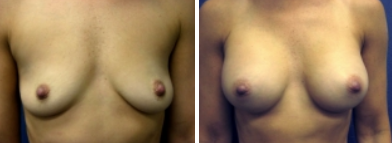Home|Blog | Are Saline Implants Safer Than Silicone Implants?
Are Saline Implants Safer Than Silicone Implants?
In 2018, over 313,000 women elected to get breast implants, and of those, more than 275,000 were silicone implants. This clearly shows the overwhelming popularity of silicone implants over saline. With so many women opting for silicone implants today, it brings up the question of whether they are a safe and reliable way to go.
An example of a smooth silicone breast implant.
Were Silicone Implants Banned?
Contrary to popular belief, silicone implants were never “banned”. Breast implants were first manufactured and offered in the United States during the 1960s, with the majority of women receiving silicone. Back then, the FDA did not require manufacturers to prove the implants’ safety and reliability. It was not until 1991 that the FDA decided to do this for silicone implants. The same was ultimately required for saline implants in 2000.
Though many studies had been done on both saline and silicone implants, the FDA demanded additional information and studies. Consequently, it restricted the use of silicone implants between 1992 and 2006 so that these studies could be done. During this period of time, silicone implants were mainly used in clinical trials for reconstruction patients (including congenital issues) and in women who either needed a lift or had ruptured implants. There were some exceptions to these restrictions that allowed others to use them as well.
It was not until the end of 2006 that the FDA was satisfied with the study data regarding the relative safety of silicone implants. Once again, the manufacturers were allowed to offer these implants to women (with a few caveats).
Is Saline Completely Safe?
Very few things in life are perfect and without issues. The same is true of saline implants. For example, not only will they not last forever, but they are also not nearly as durable as silicone implants. It is easier, however, to determine if they have lost their integrity (ruptured) because they deflate and decrease in size.
There have been rare instances where mold and bacteria have been found to be growing in the saline, though they do not generally cause any symptoms. Other issues seen with silicone implants, like capsular contracture, also occur with the saline ones.
Though not directly related to safety, the aesthetic results obtained with saline implants as compared to the silicone ones—both short and long term—are not nearly as good. This is a major reason for the overwhelming popularity of silicone breast implants.
Can Silicone Implants Cause Cancer?
Neither silicone nor saline breast implants have been shown to increase the risk of breast cancer. Textured implants, especially those produced by one manufacturer, have recently been linked to an extremely rare form of cancer known as breast implant-associated anaplastic large-cell lymphoma (BIA-ALCL). This is an immune system cancer that develops in the scar tissue around the implant, though it is not related to the implant fill material. This cancer has also has been seen with other types of implants, including dental and orthopedic.
Is Silicone Safe?
Debates about breast implant safety continues today, and research and monitoring continue. There are known risks and issues related to both saline and silicone implants, such as the development of capsular contracture, rupture, rippling, infection, etc. Nevertheless, both can be considered to be “safe”. However, one must realize that, like everything else in life, there are both known and possibly unknown risks that need to be considered before one makes a decision to proceed with surgery.
Both silicone and saline breast implants can provide excellent and safe breast augmentation (or reconstruction) results. However, silicone implants generally allow for more individualized, superior outcomes with greater refinement and a more natural look. That is why they are overwhelmingly preferred by most plastic surgeons and their patients.
For more information about implant materials, contact Dr. Turkeltaub at the Arizona Center for Breast Surgery by calling (480) 451-3000 or by filling out our online contact form.

